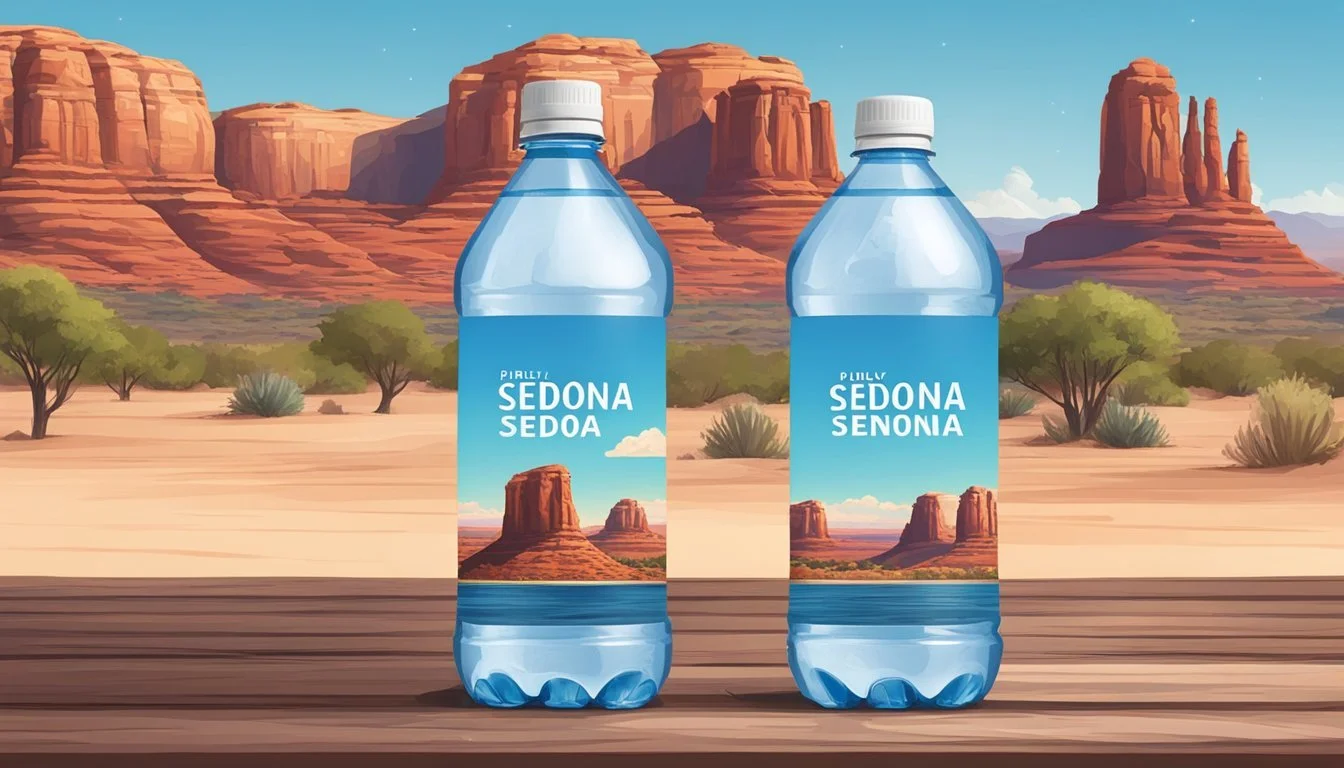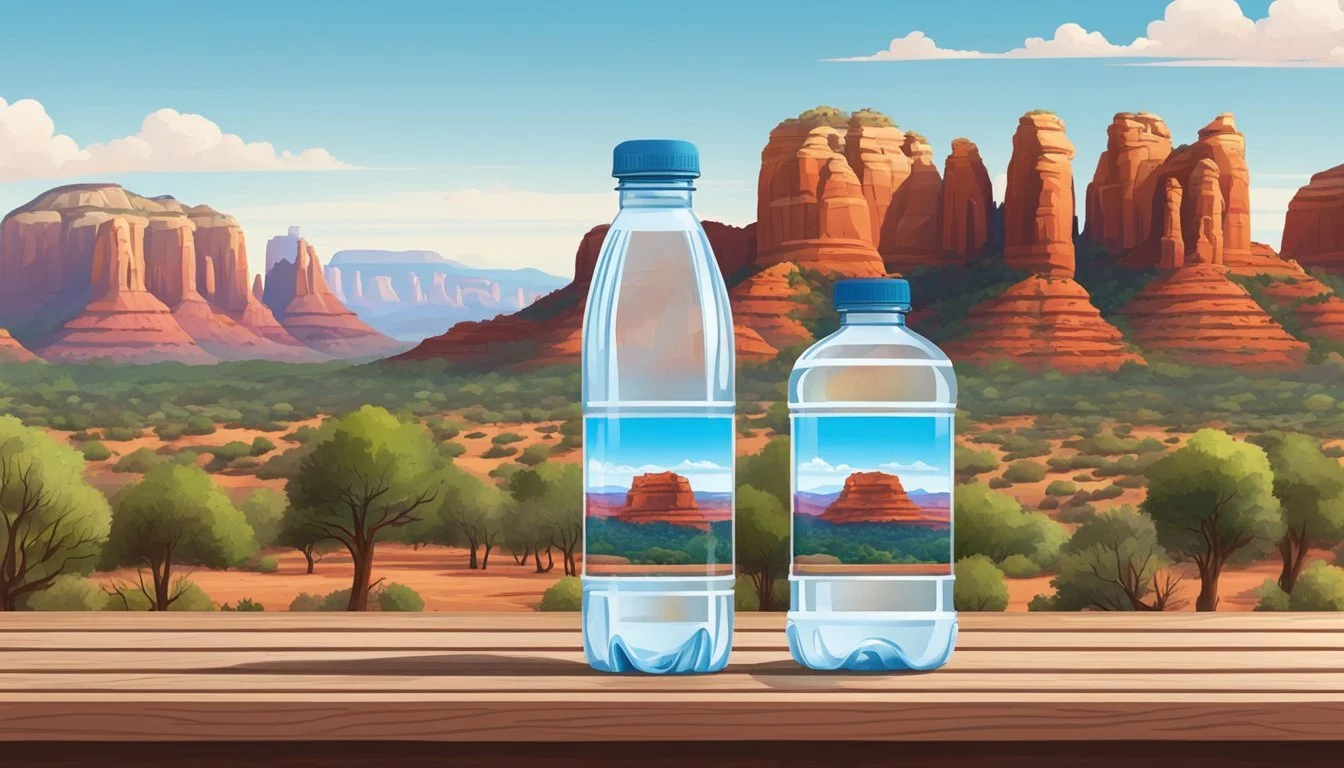Ethos vs. Purely Sedona
Which Bottled Water is Better? A Comprehensive Comparison
Choosing between Ethos and Purely Sedona bottled water can be a challenge given both brands' commitment to quality and their unique selling points. Ethos water is known for its socially conscious business model. For every bottle sold, Ethos donates a portion of the profits to support clean water programs in underprivileged communities. This aspect not only appeals to consumers' tastes but also to their values, making them feel good about their purchase.
Purely Sedona, on the other hand, emphasizes purity and origin. Sourced from the pristine natural springs of Sedona, Arizona, the water undergoes minimal processing, which ensures a fresh and clean taste. The unique mineral makeup and natural filtering process distinguish Purely Sedona as a premium option for those who prioritize natural purity in their bottled water.
Ultimately, the choice between Ethos and Purely Sedona depends on what the consumer values more—a socially responsible choice with Ethos or a focus on natural purity with Purely Sedona. Each brand offers its distinct advantages, catering to different preferences and priorities among bottled water enthusiasts.
Understanding Bottled Water
Bottled water comes in various forms and types, each differing in source and treatment process. It's essential to know what makes each unique, especially when comparing brands like Ethos and Purely Sedona.
Types of Bottled Water
Spring Water is sourced from natural springs, often touted for its natural mineral content.
Purified Water undergoes processes like reverse osmosis, removing impurities and making it highly pure, but often lacking natural minerals.
Mineral Water contains a specific amount of dissolved minerals, beneficial for health.
Alkaline Water has a higher pH level, aimed at neutralizing acid in the body.
Sparkling Water is carbonated and can come from a mineral source or be artificially carbonated.
Artesian Water is drawn from a confined aquifer and is under natural pressure.
Each type has its pros and cons, affecting taste and health benefits.
The Bottling Process
The water bottling process starts with source selection, which can be springs, wells, or municipal systems.
Filtration and treatment are crucial, involving stages like reverse osmosis and UV light treatment to ensure purity.
Bottling and packaging involve strict quality control. Bottled water brands often use recyclable materials for sustainability. Ethos, for instance, supports clean water initiatives through its packaging choices.
Distribution follows, ensuring the water reaches consumers while maintaining quality and freshness.
The process guarantees consistency and safety but can vary significantly between companies.
Water Brands Landscape
The bottled water market is diverse with numerous brands competing on purity, taste, and sustainability.
Major players include Nestlé Pure Life, known for its extensive distribution but criticized for being average.
Ethos focuses on both quality and charitable contributions, adding value to each purchase.
Purely Sedona is praised for sourcing from pristine artesian wells, appealing to those seeking natural purity.
Each brand positions itself with unique selling points, often highlighting specific water types and benefits. The competitive landscape drives innovation and variety, offering consumers numerous choices tailored to their preferences and values.
Assessing Water Quality
Understanding water quality involves evaluating several characteristics such as pH levels, mineral content, and filtration methods. These factors determine the purity, taste, and health benefits of bottled water.
Why pH Matters
pH levels indicate how acidic or alkaline the water is. A neutral pH of 7 is ideal, with anything below considered acidic and anything above alkaline. Ethos typically maintains a neutral pH, promoting a well-balanced taste. In contrast, Purely Sedona often markets its slightly alkaline water, believing it offers additional health benefits such as aiding in neutralizing body acidity.
Alkaline water from Purely Sedona may appeal to those looking for specific metabolic benefits. Consumers sensitive to acidity or seeking a more balanced pH might prefer Ethos. Monitoring pH helps ensure the water maintains its intended quality.
Minerals and Electrolytes
Mineral content, including magnesium, calcium, and potassium, impacts both the taste and health benefits of bottled water. Ethos water often contains a balanced profile of these essential minerals, enhancing both flavor and nutritional value. Purely Sedona is known for its slightly higher concentration of natural electrolytes, which can be beneficial for hydration and maintaining electrolyte balance.
Electrolytes support key bodily functions, especially after physical activity. Thus, those who are more physically active might favor Purely Sedona. evaluating the mineral content helps determine if the water aligns with dietary and health needs.
Total Dissolved Solids
Total Dissolved Solids (TDS) measure the combined content of all inorganic and organic substances present in the water. Lower TDS levels, common in Ethos water, are often associated with a cleaner, purer taste. Purely Sedona, with a moderate TDS level, can offer a richer taste profile due to the natural minerals.
TDS levels influence not just taste but also perceived purity. While some prefer low TDS for its crisp taste, others enjoy the fuller flavor and mineral benefits of higher TDS. Consumers can choose based on taste preferences and health considerations.
Purity and Filtration
Purity is determined by the absence of contaminants and adherence to stringent quality standards. Ethos prides itself on extensive filtration processes to ensure its water is free from impurities. These processes include multiple filtration stages such as reverse osmosis and carbon filtration. Purely Sedona also uses advanced filtration methods but emphasizes its source’s natural purity.
Filtration impacts the final taste and safety of the water. Ethos’s rigorous approach provides assurance of purity, making it an excellent choice for those highly concerned about contaminants. Purely Sedona offers confidence in natural purity, appealing to consumers seeking minimally processed water.
Health and Hydration
When comparing Ethos and Purely Sedona bottled water in terms of hydration and mineral content, there are a few critical factors to consider. These factors directly influence the water's health benefits and effectiveness in maintaining wellness.
Hydration for Wellness
Hydration is essential for maintaining overall health. Both Ethos and Purely Sedona offer distinct hydration benefits. Ethos water is ultra-purified and designed to provide efficient hydration by being absorbed quickly by the body. This makes it ideal for individuals in need of rapid rehydration after exercise or daily activities.
In contrast, Purely Sedona is sourced from natural springs, which some consumers prefer for its purported purity and natural taste. Its natural origin might appeal to those seeking water with minimal processing. Proper hydration supports various bodily functions such as temperature regulation, joint lubrication, and nutrient transport. Therefore, selecting between these brands involves considering personal hydration needs and lifestyle preferences.
The Role of Minerals
Minerals play a crucial role in the quality and health benefits of bottled water. Ethos water may include added electrolytes, such as potassium and magnesium, to enhance taste and support hydration. These minerals are vital for muscle function and cardiovascular health, making Ethos a potentially better choice for those seeking these specific benefits.
Purely Sedona, being naturally sourced, contains naturally occurring minerals like calcium and magnesium. Calcium is essential for bone health, while magnesium supports muscle and nerve function. These natural minerals can contribute to daily nutritional needs, making Purely Sedona appealing to consumers who prefer naturally mineralized water.
Both Ethos and Purely Sedona offer distinct advantages in terms of hydration and mineral content, providing various health benefits suited for different consumer preferences.
Comparing Ethos and Purely Sedona
Ethos and Purely Sedona offer unique characteristics, from their origins to their water quality. The following sections delve into how these two brands stand out in the bottled water market.
Company Profiles
Ethos Water was launched in 2002 with a mission to provide clean water to people in need. Ethos is owned by Starbucks and aligns its brand with social responsibility and sustainability.
Purely Sedona operates out of Sedona, Arizona. This brand focuses on providing premium natural spring water and prides itself on the purity and inherent qualities of its source.
Production Processes
Ethos emphasizes sustainable production practices, using recyclable materials for their bottles. Additionally, part of the revenue supports global clean water initiatives.
Purely Sedona sources its water from artesian springs in Sedona, filtered naturally through layers of volcanic rock and limestone. Their production process prioritizes maintaining the water's natural mineral balance, ensuring that no additives are introduced.
Water Sources and Origins
Ethos Water is primarily sourced from multiple locations, ensuring a consistent supply while adhering to high-quality standards. The origins include mountain springs and other natural sources vetted for purity.
Purely Sedona sources its water exclusively from artesian springs in Sedona. The water bubbles up through volcanic rock and limestone, naturally filtering it and enriching it with minerals. This origin near Sedona's canyons is central to the brand's identity.
Tasting Notes
Ethos is noted for its clean and crisp flavor, with a neutral taste and no aftertaste, making it appealing for general consumption. It’s versatile and pairs well with various foods and beverages.
Purely Sedona offers a slightly distinct taste profile, featuring a balanced pH of 8. The minerality from volcanic rock and limestone filtration gives it a subtle, refreshing taste. Some reviews mention a slight tang, which sets it apart from other brands.
The information provided should give a clear comparison, highlighting the unique aspects of each brand in terms of their mission, production, and taste.
Environmental and Ethical Considerations
Ethos and Purely Sedona both expose unique approaches to environmental and ethical issues, focusing on sustainability and waste management.
Sustainability Practices
Ethos Water, a subsidiary of Starbucks, commits a portion of its profits to clean water initiatives in underprivileged communities. This philanthropic effort highlights their dedication to social responsibility.
Purely Sedona sources water from naturally protected aquifers in Arizona, emphasizing minimal environmental disruption. Both brands use recyclable materials in their packaging.
Purely Sedona offers glass bottles as an alternative to plastic, showcasing an additional move towards sustainability. Ethos relies mostly on plastic but stresses their bottles’ recyclability.
Plastic Waste and Recycling
Plastic waste remains a significant concern for both brands. Ethos primarily utilizes plastic bottles, contributing to the global plastic waste issue. However, they ensure that their bottles are recyclable, promoting proper disposal and recycling habits.
Purely Sedona, by providing glass bottles, reduces plastic waste significantly. Glass is more sustainable and can be recycled repeatedly without loss of quality. This position places Purely Sedona at an advantage in terms of environmental impact.
Ethos's focus on using recyclable materials does mitigate some environmental concerns, but Purely Sedona’s use of glass bottles generally constitutes a stronger stance on reducing waste.
Both Ethos and Purely Sedona demonstrate awareness of environmental and ethical responsibilities, each addressing plastic waste and recycling through different strategies.
Consumer Preferences and Trends
Consumer preferences often hinge on factors such as taste, packaging convenience, and price. Both Ethos and Purely Sedona cater to different consumer needs and desires, reflecting broader market trends in bottled water.
Flavor and Palate
Taste and flavor are crucial in bottled water selection. Ethos water is noted for its neutral taste, making it a versatile choice for various consumers. On the other hand, Purely Sedona offers a clean and crisp flavor due to its origin from pristine artesian springs. Consumers seeking a more refined palate often lean towards Purely Sedona. Both brands avoid any aftertaste, ensuring a pure water experience. Flavor profiles can significantly influence consumer loyalty and perception of quality.
Packaging and Convenience
Packaging plays a key role in consumer decisions. Ethos typically uses plastic bottles, which are lightweight and convenient to carry. Purely Sedona, however, utilizes glass bottles, emphasizing a premium feel and sustainability. While plastic offers convenience for on-the-go usage, glass appeals to eco-conscious consumers aiming to reduce plastic waste. Both brands have embraced recyclable packaging, aligning with growing consumer demand for environmentally friendly options. Furthermore, boxed water options present an innovative, sustainable alternative, gaining popularity among younger demographics.
Price Sensitivity and Value
Price and perceived value significantly impact consumer choices. Ethos positions itself as an affordable, socially responsible option, with some proceeds supporting clean water initiatives. Purely Sedona, positioned as a premium brand, typically costs more but justifies this through its superior taste and quality. Consumers often weigh the philanthropic appeal of Ethos against the artisanal allure of Purely Sedona. Price sensitivity varies, with budget-conscious buyers opting for Ethos, while those prioritizing exclusivity and quality may lean towards Purely Sedona. Ultimately, the balance between cost and perceived value determines brand loyalty.
Availability and Accessibility
Ethos Water, a brand known for its mission to provide clean water to children, is widely available across the United States. It is sold in major grocery stores such as Walmart and Costco. Additionally, Ethos can be conveniently found in Starbucks locations, making it easily accessible for those on the go.
In contrast, Purely Sedona, sourced from the artesian springs of Sedona, Arizona, has a more limited distribution. While it can be found in select health food stores and specialty grocery chains, it is not as widely distributed as Ethos. This exclusivity may make it harder to find for some consumers.
Availability Comparison:
Venue Ethos Water Purely Sedona Major Grocery Stores Yes Limited Convenience Stores Yes No Coffee Shops Yes (Starbucks) No Online Retailers Yes Limited
For those preferring online shopping, Ethos is available on platforms like Amazon, providing easy access regardless of location. Purely Sedona also has an online presence but through fewer platforms.
Convenience Factors:
Ethos Water: High convenience due to widespread distribution in various retail environments.
Purely Sedona: Less convenient due to restricted availability, appealing mainly to niche markets.
Given the broad distribution network of Ethos, consumers are likely to find it more accessible in their daily routines. Purely Sedona, while available online and in speciality stores, may require more effort to locate.
More About Ethos
Ethos vs Mountain Valley Spring Water: Which Bottled Water is Better?
Ethos vs Richard's Rainwater: Which Bottled Water is Better?
Ethos vs Whole Foods Italian Still Mineral water: Which Bottled Water is Better?
More About Purely Sedona
Aqua Carpatica vs Purely Sedona: Which Bottled Water is Better?
Boxed Water vs Purely Sedona: Which Bottled Water is Better?
Castle Rock vs Purely Sedona: Which Bottled Water is Better?
Core Hydration vs Purely Sedona: Which Bottled Water is Better?
Hawaii Volcanic vs Purely Sedona: Which Bottled Water is Better?
Hawaiian Springs vs Purely Sedona: Which Bottled Water is Better?
Ice Mountain vs Purely Sedona: Which Bottled Water is Better?
Icelandic Glacial vs Purely Sedona: Which Bottled Water is Better?
Mountain Valley Spring Water vs Purely Sedona: Which Bottled Water is Better?
Nestle Pure Life vs Purely Sedona: Which Bottled Water is Better?
Poland Spring vs Purely Sedona: Which Bottled Water is Better?
Purely Sedona vs Cascade Mountain: Which Bottled Water is Better?
Purely Sedona vs Crystal Geyser: Which Bottled Water is Better?
Purely Sedona vs Crystal Lake: Which Bottled Water is Better?
Purely Sedona vs Essence pH10: Which Bottled Water is Better?
Purely Sedona vs Kirkland Signature: Which Bottled Water is Better?
Purely Sedona vs Liquid Death: Which Bottled Water is Better?
Purely Sedona vs Proud Source: Which Bottled Water is Better?
Purely Sedona vs Richard's Rainwater: Which Bottled Water is Better?
Purely Sedona vs Simple Truth: Which Bottled Water is Better?
Purely Sedona vs Talking Rain AQA: Which Bottled Water is Better?
Purely Sedona vs Weird Water: Which Bottled Water is Better?
Purely Sedona vs Whole Foods 365: Which Bottled Water is Better?
Purely Sedona vs Whole Foods Italian Still Mineral water: Which Bottled Water is Better?
San Pellegrino vs Purely Sedona: Which Bottled Water is Better?
Solan de Cabras vs Purely Sedona: Which Bottled Water is Better?
Zephyrhills vs Purely Sedona: Which Bottled Water is Better?





